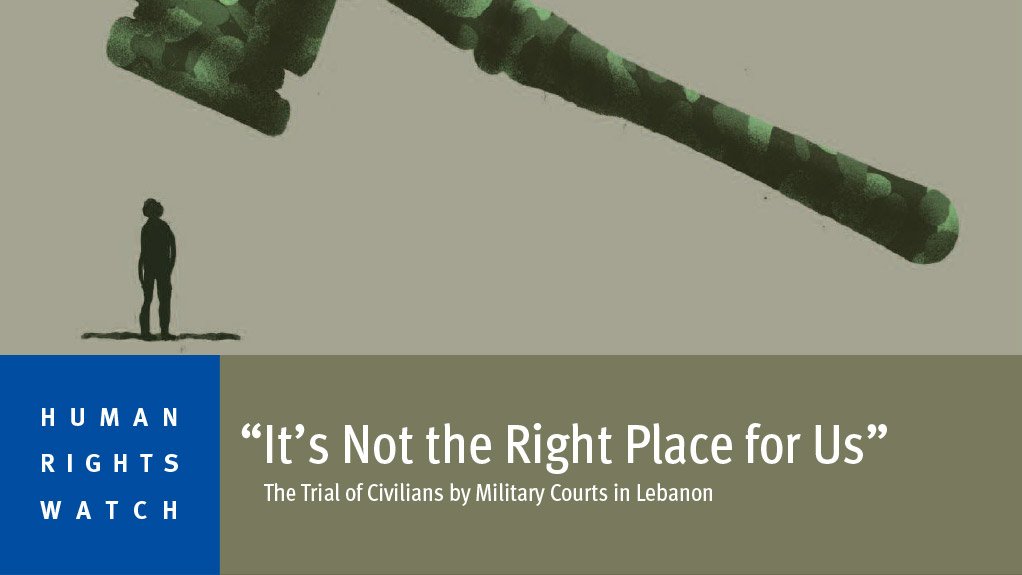- “It’s Not the Right Place for Us” – The Trial of Civilians by Military Courts in Lebanon0.98 MB
“It was the first time that I learned I could be treated this way,” said Tamara. “We were in a protest, what did we do? I had no idea that I could end up in front of a military court.” Tamara is one of 14 protesters arrested at a demonstration in 2015 over Lebanon’s inability to solve a waste management crisis, and who are on trial before a military court facing three years in prison.
The military court system in Lebanon is an exceptional judicial system that falls under the jurisdiction of the Ministry of Defense. It has broad jurisdiction over civilians, including in cases involving espionage, treason, draft evasion, unlawful contact with the enemy (Israel), or weapons possession; crimes that harm the interest of the military or the internal security forces, or the general security; as well as any conflict between civilians and military or security personnel or the civilian employees of the Ministry of Defense, army, security services, or military courts. The military courts' broad jurisdiction means that civilians can end up in military court for any interaction with security services or their employees. Children are also tried before the military courts when they are accused of these crimes. According to the Union for Protection of Juveniles in Lebanon, 355 children were tried before the military courts in 2016.
Defendants, lawyers, and Lebanese human rights organizations have expressed concern that officials within the Ministry of Defense or Lebanese Army are using the overbroad jurisdiction of the military courts as a tool for intimidation or retaliation against political speech or activism.
One of the protesters facing trial before a military court said, “I was charged because I’m one of the known figures. I’m a very nonviolent person. They’re trying to set an example, so they say ‘we can arrest you and keep you in prison. If you raise your voice, we’ll shut you down.’”
In recent years, the military prosecutor has brought charges against human rights lawyers and activists who have spoken out about torture by the Lebanese military. In another case, a military court found a woman guilty of “offending the military institution” for telling a journalist that she had been raped and tortured in military custody.
The composition of the military courts and the system for the appointment of judges undermine the courts’ competence, independence, and impartiality. Military judges are appointed by the Minister of Defense, and military judges on the courts are not required to have a law degree or legal training. Military personnel serving as judges remain subordinate to the Minister of Defense during their tenure. Furthermore, access to military court proceedings is restricted, which means that human rights organizations and journalists are not able to freely monitor the trials.
Individuals tried before the military courts and lawyers described a range of detainee rights and fair trial violations that they or their clients suffered before the military courts, including interrogations without the presence of a lawyer, ill-treatment and torture, incommunicado detention, the use of confessions extracted under torture, lengthy pretrial detention, decisions issued without an explanation, seemingly arbitrary sentences, and a limited right to appeal.
Human Rights Watch documented ten cases in which civilians being detained by military personnel said that they were tortured at various points during their detentions, including interrogations. In eight of these cases, detainees tried before the military courts on terrorism or security related offenses were tortured, forced to confess, and had their coerced confessions used as evidence against them in court. Suspects detained by the military are often held incommunicado and interrogated without the presence of a lawyer. Lebanese human rights organizations and lawyers described a troubling pattern of seemingly routine torture of detainees in military custody. In some of the cases documented by Human Rights Watch, the coerced confession was the only evidence of guilt presented against the accused. “I’m always worried about military investigations,” one lawyer said. “There will always be some form of violence.”
Report by the Human Rights Watch
EMAIL THIS ARTICLE SAVE THIS ARTICLE ARTICLE ENQUIRY
To subscribe email subscriptions@creamermedia.co.za or click here
To advertise email advertising@creamermedia.co.za or click here











